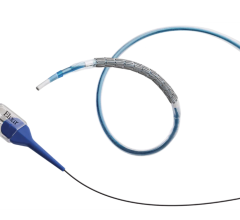September 11, 2008 -Cook Medical has completed enrollment in the first international clinical trial of a first-of-its-kind drug-eluting stent designed to treat arterial blockages outside the coronary arteries.
The 420 patients enrolled in Cook’s randomized trial of its Zilver PTX Drug Eluting Peripheral Stent include peripheral arterial disease (PAD) patients treated in Germany the U.S. and Japan.
In many cases, PAD patients who have been treated with balloon angioplasty and stenting experience restenosis, or renarrowing of the arteries, over time and must undergo more invasive treatment such as bypass surgery to restore blood flow to key arteries. The Zilver PTX trial (www.zilverptxtrial.com) was designed to determine whether the combination of Cook’s Zilver stent and a paclitaxel coating will keep peripheral arteries, specifically the superficial femoral artery (SFA), open over time.
“I am honored to have been selected as global principle investigator of the clinical evaluation of this device,” said Michael Dake, M.D., professor of radiology, internal medicine and surgery and chairman of the Department of Radiology at the University of Virginia Health System. “The Zilver PTX stent could become a breakthrough device in treating peripheral arterial disease with the potential to improve the quality of life of millions of patients suffering from this increasingly common disease. I commend Cook Medical for its commitment to bringing this important technology to the market, and hope that the positive early results we’ve document are reflected in the study’s final data.”
Cook has enrolled an additional 780 patients in the European Union, Canada, and Korea in a clinical registry to evaluate the safety of the Zilver PTX device. Those data have been used for a submission in Europe for CE Mark approval to market the device there, with additional regulatory submissions pending in additional markets. In addition, the revolutionary stent already has regulatory approval for commercial use in New Zealand, Hong Kong and Singapore, where it has been used to treat patients suffering with PAD.
Cook Medical’s Zilver PTX, a self-expanding nitinol stent, uses a proprietary, polymer-free technology to coat the device with paclitaxel, an antiproliferative drug that has been used successfully to reduce the risk of renarrowing of arteries following angioplasty in coronary disease patients. Cook’s unique ability to adhere the drug to the stent body without using a polymer may be a major clinical advantage, since it eliminates the risk some patients may face due to allergic reactions and other potentially poor outcomes that may be associated with the polymer coatings used on the current generation of drug-eluting coronary stents. Cook licenses the rights to use paclitaxel on peripheral stents and other non-coronary medical devices from Angiotech Pharmaceuticals of Vancouver, British Columbia, Canada.
Preliminary findings presented by Dr. Dake at the Society for Vascular Surgery (SVS) meeting in June revealed clinical improvement in patients treated with the Zilver PTX, excellent stent durability (i.e., fracture resistance), high rates of event-free survival and freedom from target lesion revascularization. This preliminary information suggests no safety concerns, and promising effectiveness results, Dr. Dake reported at the SVS event.
Peripheral arterial disease (PAD) affects blood vessels that lead from the heart to other areas of the body, such as the legs, feet and kidneys. When these blood vessels become blocked due to the build-up of fatty deposits, blood circulation is restricted. Untreated, PAD results in pain when walking and can lead to gangrene and amputation. The condition is widespread worldwide, with few interventional medical treatments available to address the buildup of atherosclerotic plaque within the artery that restricts blood flow.
For more information: www.cookmedical.com


 July 02, 2024
July 02, 2024 









